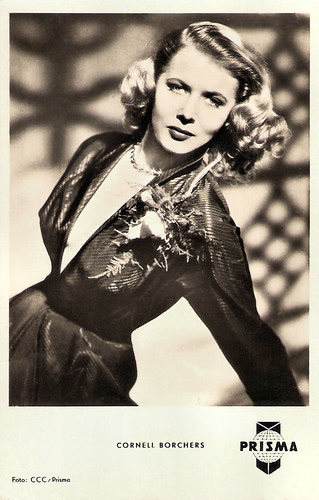
German postcard by Kunst und Bild, Berlin, no. A428. Photo: CCC / Prisma.
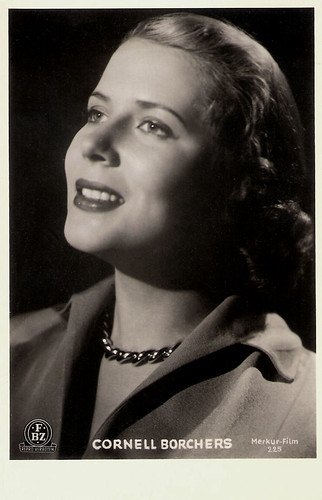
German postcard by FBZ, no. 225. Photo: Merkur-Film. Publicity still for Das ewige Spiel/The eternal game (Frantisek Cáp, 1951).
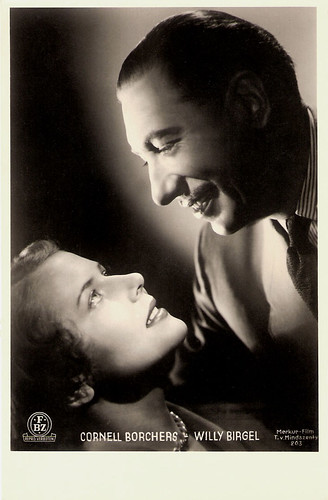
German postcard by FBZ, no. 225. Photo: Merkur-Film / T. v. Mindszenty. Publicity still for Das ewige Spiel/The eternal game (Frantisek Cáp, 1951) with Willy Birgel.
Berlin airlift
Cornell Borchers was born Cornelia Bruch in Heydekrug (now Silute) in former East Prussia (now Lithuania) in 1925. She first studied medicine at the Universität Göttingen for two semesters before she attended drama classes in 1947 and 1948.
In 1948 she was discovered by film director Arthur Maria Rabenalt. Borchers debuted in his Anonyme Briefe/Anonymous Letters (1949) and also appeared in his Martina (1949). She then signed a seven-year contract with 20th Century Fox. Publicity quickly touted her as 'the new Ingrid Bergman', but her first Hollywood sojourn turned out to be rather brief.
Her first film was the American-German co-production The Big Lift (George Seaton, 1951). It tells the story of 'Operation Vittles', the 1948–1949 Berlin Airlift because of the Soviet blockade of Berlin, through the experiences of two U.S. Air Force sergeants (Montgomery Clift and Paul Douglas). The film was photographed at real locations. Borchers played a German girl who had a doomed love affair with Montgomery Clift.
After The Big Lift (1950), Borchers walked out on her contract with 20th Century Fox, convinced that quality roles were not forthcoming. She returned to Germany, where she appeared in a series of forgettable crime dramas and romances. Then she got a new chance.
In the British drama The Divided Heart (Charles Crichton, 1954), she and Armin Dahlen play a childless couple in Germany who adopt a young child, whose mother (Yvonne Mitchell) has disappeared during the war. When the boy is 10 years old, his natural mother is found alive in Yugoslavia where she has survived the war as a refugee. She returns to Germany to claim her child, having lost her husband and two other children in the war. The Divided Heart was a popular and critical success, being highly praised for its sensitivity, emotional impact and the even-handedness with which it dealt with its subject matter. It won three British Academy Film Awards (BAFTA's), including one for Borchers in the category of Best Foreign Actress.
German card. Photo: 20th Century Fox.
German postcard by WS-Druck, Wanne-Eickel, no. 224. Photo: Ringpress / Vogelmann.
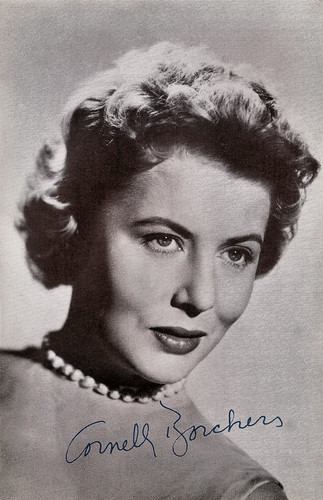
British postcard in the Celebrity Autograph Series, no. 255, by Celebrity Publishers Ltd., London. Photo: Universal-International. Publicity still for Istanbul (Joseph Pevney, 1957).
Heimatfilm
Cornell Borchers married twice, first to the Brit Bruce Cunningham and later to Dr. Anton Schelkopf, a psychologist and film producer/director whom she had met when she starred in his comedy Schule für Eheglück/School for Connubial Bliss (Rainer Geis, Anton Schelkopf, 1954).
Together they also made the Heimatfilm Rot ist die Liebe/Love is Red (Karl Hartl, 1957), in which she starred opposite Dieter Borsche.
She returned to Hollywood. For Universal, she starred opposite Rock Hudson in the romance Never Say Goodbye (Jerry Hopper, 1956), and with Errol Flynn and Nat King Cole in the adventure-drama Istanbul (Joseph Pevney, 1957). I.S. Mowis at IMDb: "Her swan song was an undistinguished social drama entitled Flood Tide (1958), a misfire, which resulted in Universal failing to renew her contract."
Her last film was the German film Arzt ohne Gewissen/Doctor Without Scruples (Falk Harnack, 1959) starring Ewald Balser. Then she retired from acting and raised her three children: Christian Amadeus (1953) with Bruce Cunningham, Gabriel Antonius (1961) and Julia Kathrin (1962) with Anton Schelkopf.,
Cornell Borchers later divorced Schelkopf and lived quietly at the Starnberger See in Bavaria. There she died on 12 May 2014. She was 89.
German card by Kolibri-Verlag, Minden (Westf.), no. F 44. Retail price: 25 Pf. Photo: Ringpress / Vogelmann.
German card by WS-Druck, Wanne-Eickel, no. N.F 3. Photo: Klaus Collignon.
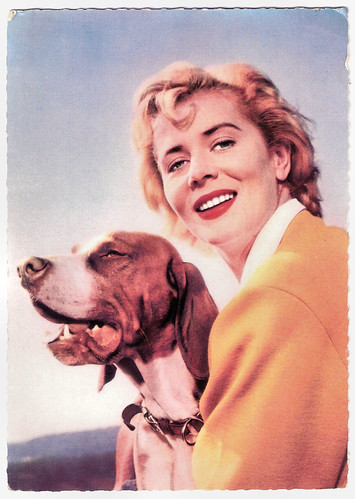
German postcard by ISV, no. L 3. Photo: Klaus Collignon.
German postcard by WS-Druck, Wanne-Eickel, no. F 52. Photo: Ringpress / Vogelmann / Bavaria.
Sources: I.S. Mowis (IMDb), Hal Erickson (AllMovie), Sandra Brennan (AllMovie), Wikipedia, and IMDb.
This post was last updated on 8 July 2023.
1 comment:
Is there any text on the back?
Post a Comment